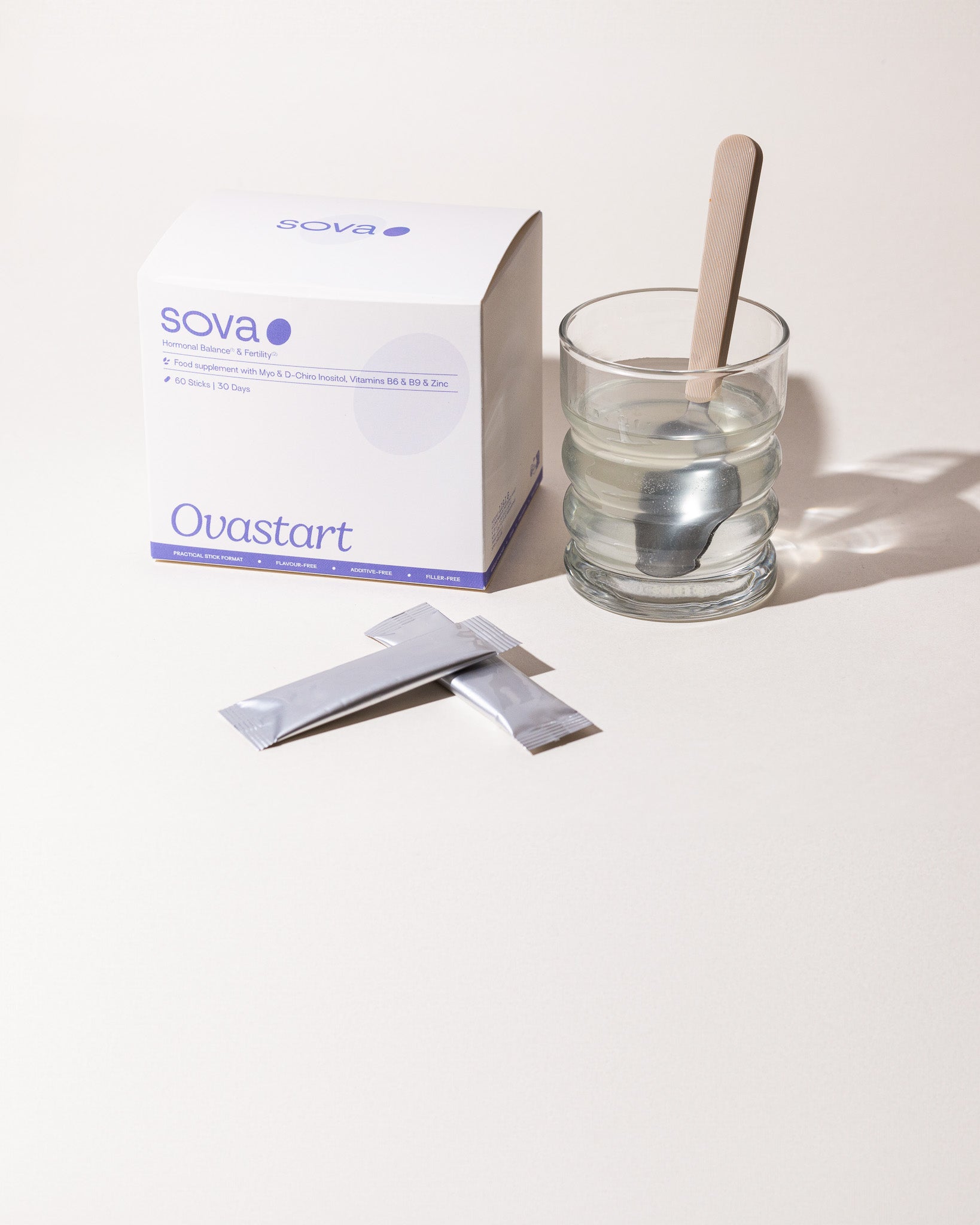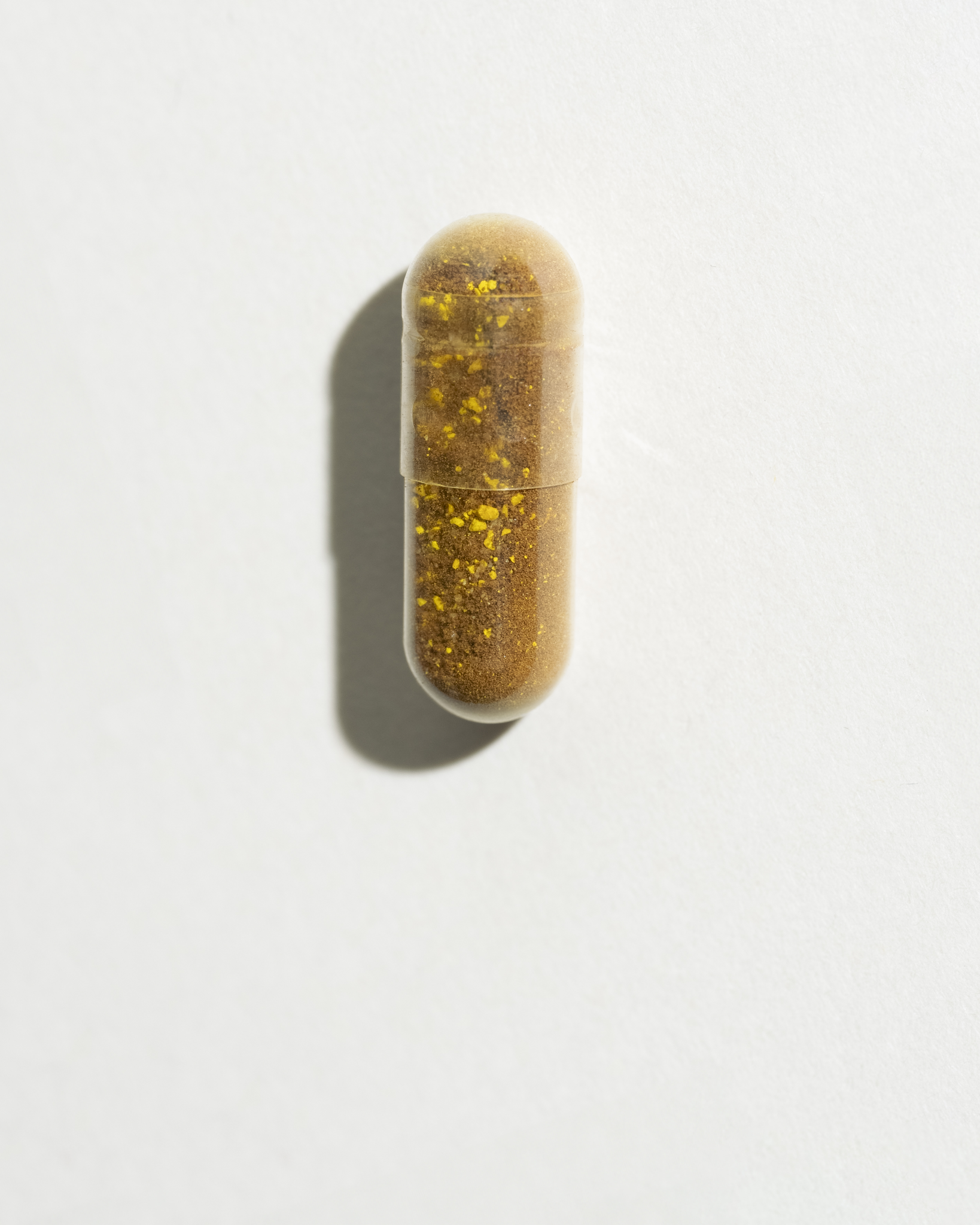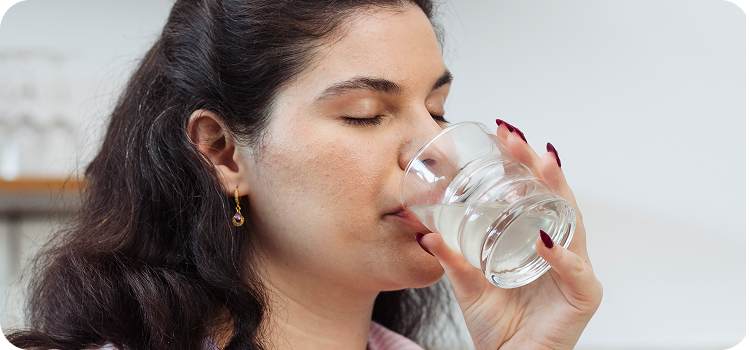Table of contents
Polycystic Ovary Syndrome (PCOS) is much more than just a medical condition; it’s a complex disorder that can influence many aspects of a woman’s life, including her emotional well-being.
Women living with PCOS (perhaps this resonates with you) often face a significant emotional burden due to hormonal fluctuations and the challenges associated with the condition. This guide explores the deep connection between PCOS and stress, highlighting how this condition can impact your ability to manage stress and emotions.
Our goal is to provide you with practical advice and natural solutions to help you effectively manage the stress associated with PCOS. By exploring approaches such as naturopathy, herbal medicine, breathing techniques, and adaptogenic plants, we aim to equip you with concrete tools to soothe your stress and better manage your emotions.
✨ Not sure where to start? Take our 2‑minute PCOS Product Quiz to see which supplements fit your symptoms best.

Understanding PCOS-related stress
If you’ve read our article on PCOS and Mental Health, you already know that PCOS isn’t just physical. In this first section, we will explore some key concepts around stress and PCOS, helping you to better understand why it’s particularly beneficial for you to manage your stress and emotions more effectively, especially if you are living with this chronic condition.
A reminder of how PCOS affects your emotional well-being
A society under increasing stress
In Western society, stress has become a major public health concern. The constant demands of modern life—such as work pressures, financial worries, complex interpersonal relationships, and information overload—contribute to high levels of stress for many people. (1) Chronic stress can have a devastating impact on physical and mental health, leading to an increase in cardiovascular diseases, mental health disorders such as anxiety and depression, and metabolic conditions like diabetes. (2) Furthermore, the fast pace of life and the culture of performance often prevent us from taking the necessary time to recharge our batteries and effectively manage stress.
Thus, chronic stress fosters the development of various diseases, and if you have predispositions (genetic or otherwise) that make you susceptible to PCOS symptoms, stress can exacerbate your condition. (To learn more about the causes of PCOS)
👉 Curious about PCOS triggers? Read: Can PCOS be cured?
The impact of PCOS on your stress levels
To summarise the key points from our article PCOS and Mental Health:
- PCOS has a significant impact on emotional well-being, in addition to its physical symptoms.
- The hormonal fluctuations associated with PCOS can lead to an emotional rollercoaster, affecting mood and self-esteem.
- Physical symptoms such as menstrual irregularities and hormonal imbalances can cause emotional highs and lows.
- The fertility challenges linked to PCOS can trigger feelings of frustration, sadness, and anxiety in affected women.
- It’s essential to acknowledge this emotional impact as part of a holistic approach to managing PCOS, emphasising the importance of mental health on the journey towards overall well-being.
✨ For a holistic approach to symptom relief, explore our PCOS Balance Bundle (Ovastart + Sugar Balance) — the duo most women start with.
The stress cycle and its consequences on overall health
Before diving into the practical advice to help you improve your stress management techniques while suffering from PCOS, let’s revisit some basic concepts to better understand stress and its manifestations.
Definition of stress according to Dr. SELYE
Dr. Hans Selye, a renowned endocrinologist from the 20th century, is well-known for his pioneering research on stress. He defined stress as the body’s response to any difficult situation. According to him, stress can be broken down into three key points:
- Stressors: The cause of stress is usually something that puts pressure on us, be they worries or external problems like noise or conflicts. This makes us uncomfortable, both physically and mentally.
- The result of these stressors: Stress is the body’s response to what makes us feel tense. It’s the direct consequence of being under pressure.
- Effects on health: Stress can have a real impact on our health. It can cause headaches, sleep disturbances, digestive problems, and even anxiety, depression, or fatigue. This is why it’s important to manage stress effectively to stay healthy. (3)
The 3 phases of stress:
According to Dr. Selye, when you experience stress, your body goes through three successive stages (4):
- The Alarm Phase: During this phase, the body perceives stress (as discussed earlier) and reacts by mobilising its resources to deal with the situation. This initial stage of the stress response is characterised by increased hormonal activity, particularly adrenaline and cortisol (produced by the adrenal glands). Your body prepares to react by either fleeing, fighting, or freezing (the inability to move or respond).
For example: You receive an angry email from your boss. You may start to feel warmth and tingling in your body, your heart may race, and you might feel short of breath. This is your body gearing up to respond to the stressful email: you might prepare to fight (by responding with a less-than-polite reply), flee (by leaving the email unread), or freeze (by being unable to react at all).
- The Resistance Phase: If the stress persists (the stressor remains present), your body enters a resistance phase, where it tries to adapt to the ongoing demand by mobilising its defence mechanisms. Stress hormones remain elevated, but the body attempts to maintain a certain level of functioning. This phase is primarily characterised by the production of cortisol (a hormone produced by the adrenal glands) to continue adapting to the stressful situation. Normally, once the stressor disappears, your body returns to its baseline state, and stress hormones decrease.
Example: you’re still at work, your relationships with colleagues haven't improved, and you feel anxious every day. You sleep poorly, feel constantly stressed and overwhelmed, and cope by drinking excessive coffee (or smoking) or indulging in sweets to get through these tough moments. Your stress response persists over time.
- The Exhaustion Phase: If stress continues for a prolonged period and the body's resources are depleted, it enters the exhaustion phase. This can lead to decreased resistance to illness, physical and emotional burnout, and even chronic diseases. This exhaustion can worsen the physical symptoms caused by chronic stress, as detailed below.
Example: In this ongoing toxic work environment, stress and fatigue accumulate to the point where you no longer feel them. This phase brings you closer to burnout or depression as you’ve exhausted your ability to adapt to stress, and your body can no longer keep up. You may get sick frequently, experience widespread pain (such as tendinitis or stress-related muscle contractions), and become hyper-emotional (more sensitive to emotional stimuli from your environment), among other issues.
The physical consequences of stress on our bodies are wide-ranging and can include sleep disturbances, gastrointestinal issues, headaches, muscle tension, high blood pressure, increased heart rate, reduced immune system efficiency, and more.
As with many chronic conditions (6), stress can negatively impact the symptoms you may experience with PCOS. Here’s how:
The impact of of chronic stress on PCOS
Chronic stress can have several detrimental effects on PCOS and its associated symptoms (7):
- It exacerbates hormonal imbalances by promoting the production of male hormones (androgens). (8)
- It increases insulin resistance, which can lead to weight gain and fertility issues. (9)
- It heightens chronic inflammation (10), worsening physical symptoms such as acne and hirsutism. (11)
- It disrupts menstrual cycles and can reduce the quality of oocytes, thereby decreasing chances of pregnancy. (12)
It is important to note that women with PCOS often experience higher levels of chronic stress compared to the general population. (13)
Raising awareness about the negative consequences of stress is crucial for a holistic approach to managing PCOS, highlighting the importance of addressing both the physiological and emotional aspects of the syndrome.

Natural approaches to manage PCOS-related stress
In this section, we will explore natural strategies that can help you manage your stress and, in turn, alleviate your PCOS symptoms. At SOVA, our mission is to help you enhance your overall well-being. 😘
You'll find tips on naturopathy, herbal medicine, and breathing exercises!
Naturopathy tips for better managing PCOS-related stress
Balanced diet to regulate hormones
To regulate hormones and promote emotional balance, you can prioritize foods rich in:
- Omega-3s (oily fish, walnuts, and flax seeds) which support the nervous system. (14)
- B vitamins, particularly B6 (found in green vegetables, whole grains, and legumes), which are crucial for hormonal regulation. (15)
- Magnesium (found in green vegetables, nuts, and seeds), which helps modulate the nervous system and reduce stress. (16)
Limit pro-inflammatory foods and drinks that stimulate increased cortisol production, including:
- Gluten and dairy products, especially if you have food intolerances or irritable bowel syndrome.
- High-glycaemic foods, such as processed meals and refined carbohydrates, which can worsen inflammation. (17)
- Stimulant drinks like coffee (18), black tea, and alcohol, as they can negatively affect your stress response.
👉 For a full nutrition guide, see: Nutrition and PCOS: The key rules of a diet adapted to your type of PCOS.
Hydration and body detoxification
Drinking enough water is essential not only for managing your PCOS symptoms but also for better stress management:
Water is the body's essential fuel, supporting not only healthy skin and optimal digestion but also hormone regulation(19). Aim to drink at least 1.5 litres of water daily, as it contributes to various health aspects related to PCOS:
- Reducing inflammation: Water helps maintain cell membrane fluidity and therefore helps regulating the body’s inflammatory responses. (20)
- Managing stress: Proper hydration supports a more effective stress response by reducing cortisol production, thereby mitigating stress symptoms.
- Supporting the nervous system: Water is vital for the proper functioning of the nervous system, helping with nerve signal transmission and contributing to better emotional and stress regulation. Studies have also highlighted a link between dehydration and cognitive imbalances, such as memory and concentration issues. (21)
Physical activity and stress management
The connection between regular physical activity and stress management is crucial for improving the well-being of those living with PCOS. Regular exercise helps reduce chronic inflammation (22), which, as previously mentioned, is often exacerbated in individuals with PCOS. This reduction in inflammation can also play a significant role in hormonal regulation, thereby helping to alleviate stress-related symptoms.
Moderate exercise helps maintain balanced cortisol levels. (23) Cortisol, the stress hormone, is more effectively regulated in those who incorporate regular physical activity into their routine. This can have a positive impact on your overall stress management.
Be mindful of exercise intensity: While physical activity is beneficial, it is essential to find a balance and avoid overly intense exercise. Excessive intensity can trigger additional stress responses and worsen your PCOS symptoms. (24)
Opt for moderate exercises that are tailored to your physical condition. We consider intense exercise to be anything that exhausts your body. Of course, if you are already athletic, the term “intense exercise” will have a different meaning for you.
👉 Read more: Best types of exercise for PCOS.
Herbal medicine for stress management
Herbal medicine involves the use of plants for therapeutic purposes (to heal or alleviate symptoms). I’ll offer here, advice primarily on the use of adaptogenic plants and herbal teas to help manage your stress.
Using adaptogenic plants to balance your stress response
Adaptogenic plants are powerful allies in stress management. They are defined by their ability to help the body adapt to various stresses, whether physical, emotional, or environmental. Several scientific studies support the efficacy of adaptogenic plants in regulating the nervous system, thus promoting a more balanced stress response. (25) For example, ashwagandha is renowned for its calming properties and potential to reduce stress. It works by helping the body adapt to stressful situations, thereby regulating stress hormones such as cortisol. Meanwhile, saffron is known for its antidepressant properties by stimulating the production of serotonin, the neurotransmitter associated with emotional well-being. (26)
Beneficial herbal teas and decoctions
Infusing herbs offers a gentle and soothing approach to calming the mind and promoting relaxation. Various plants are particularly effective in achieving this:
- Roman chamomile (27): Known for its soothing properties, Roman chamomile is often used to calm nerves and induce relaxation.
- Passionflower (28): Passionflower is renowned for its relaxing effects, helping to relieve anxiety and promote restful sleep.
- Hawthorn (29): Hawthorn is known for its calming effect on the cardiovascular system, useful for easing palpitations and anxiety.
- Lavender (30): This aromatic plant can be added to infusions for its calming effect on the nervous system, creating a relaxing atmosphere.
Incorporating these infusions into your daily routine can create moments of calm and relaxation, contributing to healthier stress management with PCOS. You might consider visiting a local herbalist to create a custom anti-stress blend! Ideally, try to choose organic herbs.
Breathing techniques to help you relax
Another key to positively influencing your stress levels is learning to breathe better. Breathing will allow you to induce a relaxed state , thereby calming your stress-prone mind. Here are three techniques: diaphragmatic breathing, coherence breathing, and mindfulness meditation.
Deep abdominal breathing
Deep abdominal breathing is a simple yet powerful technique to calm the nervous system and reduce stress associated with PCOS. (31)
Here's how to practice it: Sit comfortably with your back straight. Place one hand on your chest and the other on your abdomen. Inhale deeply through your nose, ensuring your abdomen rises rather than your chest. Exhale slowly through your mouth, releasing the air completely. Repeat this process several times for a few minutes. (32)
Deep breathing activates the parasympathetic nervous system, triggering a relaxation response. This reduces cortisol production and promotes a state of mental calm, helping you manage the emotional pressures linked to PCOS.
Heart coherence exercises
Heart coherence is a rythmic breathing technique designed to balance the mind by soothing the nervous system. It involves breathing at a regular rhythm, typically six breaths per minute, for about five minutes.
Here’s a practical example: Sit comfortably in a quiet space. Breathe deeply and steadily, counting 5 seconds for inhalation (through the nose) and 5 seconds for exhalation (through the mouth). Repeat this process for five minutes.
Heart coherence helps regulate heart rate variability, promoting a more balanced response to stress. This technique can also positively impact PCOS symptoms by reducing inflammation and improving hormonal regulation. It's important to note, however, that the benefits of this method are not permanent; daily practice is necessary to maintain long-term effects.
Guided meditation for mental calm
Mindfulness meditation involves intentionally focusing on the present moment without judgment. This can be done by concentrating on your breath, body sensations, or through guided meditations. (33) Mindfulness meditation is known to reduce stress by altering the brain's response to stress. (34) It promotes relaxation, enhances mental clarity, and encourages a more positive outlook on the challenges of PCOS.
For women with PCOS, several studies have demonstrated the benefits of mindfulness practice: One study on adolescents with PCOS showed improvements in psychological distress after eight weeks of guided daily mindfulness practice. (35) Another study on adult women found a reduction in stress through bi-weekly 90-minute group sessions. (36)
If these techniques don't resonate with you, you might consider seeking guidance through sophrology or simply practicing a body scan (visualising different parts of your body in your mind to calm your breath and heart rate). The key is to try different approaches and find what works best for you! 😉

Finding serenity
As we've explored together, you can make various changes to your daily routine to better manage stress related to PCOS. Whether it's adjusting your diet, engaging in regular physical activity, staying well-hydrated, using soothing herbs, or incorporating breathing exercises, you have a wealth of tools at your disposal to improve your symptoms day by day! 👏
However, it is crucial to remember that these tips do not replace professional medical advice. If needed, we strongly encourage you to consult a healthcare professional. Every case is unique, and medical experts are there to provide you with tailored guidance. Don't hesitate to consult a psychologist who can help you better understand the situations that cause you stress and assist you in developing strategies to manage them more effectively.
✨ Take the SOVA Product Quiz — it’s a simple way to see which supplements (like Ovastart for hormonal balance or Sugar Balance for insulin support) fit your symptoms best.
Finally, this little guide aims to strengthen our community of sharing and support. We invite you to share experiences, tips, and strategies that you’ve found helpful in managing PCOS-related stress. By coming together, sharing our knowledge, and offering mutual support, we contribute to creating a caring and informed community around this condition that concerns us all. 🤗
Scientific references
SOVA was created by two sisters with PCOS who wanted products that truly worked. Our formulas are developed in-house with women’s health and micronutrition experts, using ingredients backed by clinical studies and compliant with European regulations.
- Built by women with PCOS, we know the reality of the symptoms.
- Clinically studied, high-quality ingredients, including patented forms like Quatrefolic® and an optimal Myo-/D-Chiro Inositol ratio.
- Holistic support for hormonal balance, metabolic health, inflammation, mood and cycle regulation.
- Transparent, science-led formulas with no unnecessary additives.
















